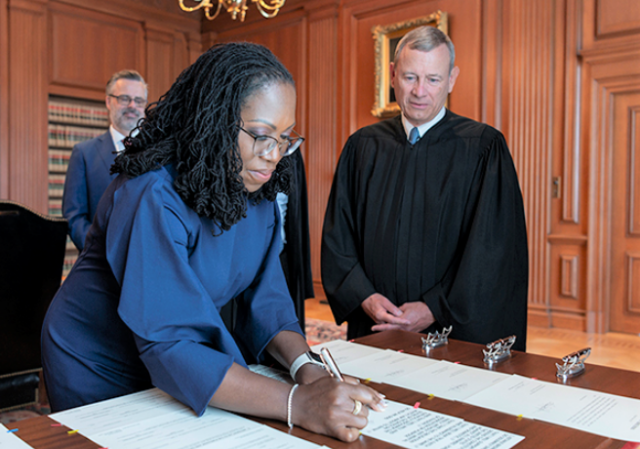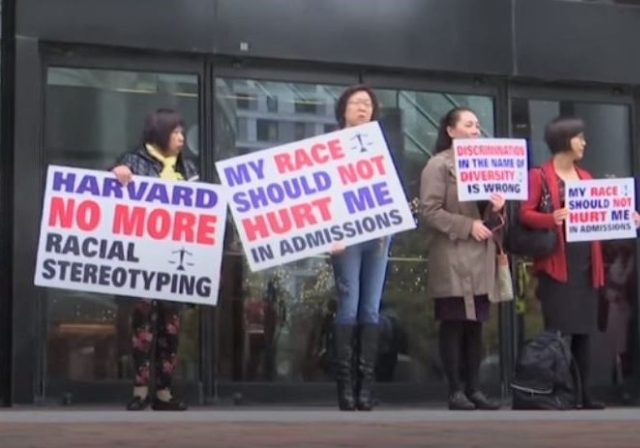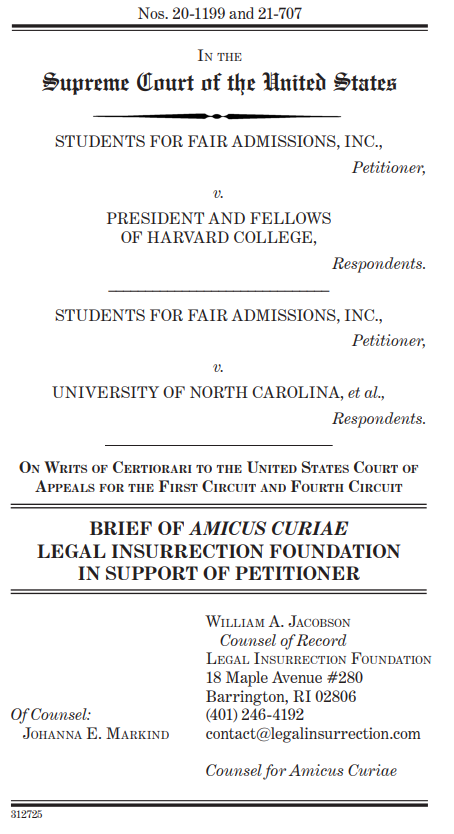SCOTUS Splits Up Affirmative Action Cases So KBJ Can Participate On UNC, After She Recused From Harvard Case
The decoupling will allow Jackson, who’s on Harvard’s Board of Overseers, to participate in the University of North Carolina case while still recusing herself from the Harvard case.

Last Friday, the Supreme Court disaggregated the two discriminatory admissions cases on its docket next year.
LIF readers may remember that, during her confirmation hearings, Judge (now Justice) Ketanji Brown Jackson said she planned not to participate in the pending case of Students for Fair Admissions v. Harvard. Under Senator Cruz’s questioning, then-Judge Jackson indicated she would recuse herself because she’s a member of the Harvard Board of Overseers, and would have a conflict of interest in deciding the case.
As strange as it may seem, Supreme Court justices are not required to follow ethics rules that bind other judges, although they usually recuse themselves for conflicts of interest.
Since January 24, 2022, the Harvard case had been consolidated with another case involving the University of North Carolina. Both cases involve challenges to the legality of what used to be called reverse discrimination (now usually called affirmative action) in university admission policies. The UNC case concerns use of discriminatory admissions by a government actor; the Harvard case, by a private school. Both lawsuits were brought by the same plaintiff, an Asian-American advocacy organization. Typically, Asian-Americans have to score significantly higher on admissions tests compared to blacks, Hispanics, and whites in order to be admitted to college. The cases were briefed together; that is, most of the briefs concern both cases.
So why were the cases decoupled? Presumably, to allow Justice Jackson to participate in the UNC case. (The order decoupling the cases was careful to note that “Justice Jackson took no part in the consideration of this order.”)
The addition of Justice Jackson doesn’t affect the number of justices needed to change the outcome. When the Court is equally divided, the lower court decision is affirmed. Plaintiffs lost the case below, so they would need five votes to overrule the lower court whether eight or nine justices hear the case.
What Justice Jackson’s presence on the panel does is remove a potential argument against the high court’s credibility, by including a voice likely to side with the other liberal justices. In that, it’s consistent with Chief Justice Roberts’ desperate efforts to protect the Court’s institutional legitimacy. That’s not to say that Jackson’s presence will guarantee legitimacy.
Gone are the days when opponents of Court decisions try to persuade by countering the Court’s legal analysis with counter-arguments. Instead, they simply assert that its decisions are illegitimate and that the Court lacks institutional credibility. Although both sides have been guilty, this has been a particular hallmark of leftist tactics.
For example, before the Supreme Court upheld the Affordable Care Act (ACA), then-President Obama publicly charged that any decision “overturn[ing] a duly constituted and passed law” would be an “unprecedented, extraordinary step” of “judicial activism” as well as undemocratic. Obama – a former constitutional law professor – presumably knew that not every law passed by Congress is constitutional, and that it’s the Court’s job to decide whether it is constitutional. He certainly did not believe laws passed by Congress were necessarily constitutional when, fourteen months before his comments on the ACA case, he directed his Justice Department not to defend the constitutionality of the Defense of Marriage Act (DOMA). (Obama himself had previously opposed gay marriage.)
This is now the Democrats’ go-to response to any Supreme Court decision with which they disagree – the Court is playing politics, instead of deciding the case on a legal basis. Needless to say, the latter necessarily means the Court supports any position favored by the Democrats.
Arguably, the Chief Justice’s effort in Dobbs v. Jackson to “split the baby,” so to speak, by upholding the Mississippi law while also re-affirming Roe v. Wade and Casey v. Planned Parenthood was part of Roberts’ efforts to defuse these constant attacks on the Court’s legitimacy.

Which brings us back to the UNC case. For those less skeptical of the high court’s motives, there are reasons to believe there’s a good chance the Court will hold that discriminatory admissions violate the Constitutional guarantee of Equal Protection of the laws. By definition, discriminatory admissions treat people unequally. In these cases, plaintiffs challenge that they are being treated unequally on the basis of race. The Court is especially skeptical about racial classifications and applies exacting standards against them.
In the leading case (Grutter v. Bollinger) on discriminatory college admissions, the Court did not issue a carte blanche for schools to discriminate forever, but only as a temporary means to further the stated goal of diversity of perspectives. (LIF’s William Jacobson filed an amicus brief in the Harvard and UNC cases explaining the fallacy of Grutter’s reasoning.) Even O’Connor’s majority opinion stated, “We expect that 25 years from now, the use of racial preferences will no longer be necessary to further the interest approved today.” That was nineteen years ago. With the exception of Justice Thomas, the Supreme Court’s composition has completely changed since Grutter was decided in 2003; Thomas dissented from the part of Justice O’Connor’s opinion upholding discriminatory admissions.Two other justices – the Chief Justice and Justice Alito – had joined the Court by the time it decided the 2007 discriminatory admissions case, Parents Involved in Community Schools v. Seattle Sch. Dist. No. 1. In that case, the Court rejected a school district’s racial classification scheme. Thomas and Alito both joined Roberts’ plurality opinion, in which the Chief Justice opined, “The way to stop discrimination on the basis of race is to stop discriminating on the basis of race.”
It seems reasonable to suppose that there are already three justices willing to rule that discriminatory admissions violate the Constitution, and since then, three more conservative justices have joined the Court.
Whether the Court disallows UNC’s and/or Harvard’s admissions policies or not, there’s a good chance the discriminatory admissions cases will be the Court’s most significant cases next term. It’s unlikely that the Court would uphold discriminatory admissions in a case involving a state university while rejecting it in a private school case, so in many ways UNC is the more significant case. That makes it all the more important that the new Democratic appointee, herself a minority, have a voice in deciding the case, and be seen to have a voice in deciding the case.
That is especially so if the Court ends up disallowing discriminatory admissions. Jackson’s presence won’t prevent criticism of the Court for reaching a “political” decision; but her absence would give critics another weapon.
 DONATE
DONATE
Donations tax deductible
to the full extent allowed by law.









Comments
Affirmative discrimination under the Diversity [dogma] (i.e. color judgment, class-based bigotry), Inequity, and Exclusion (DIE) doctrine of the Pro-Choice ethical religion of the Progressive Cult (PC). One step forward, two steps backward.
Translation: there is a dumbsh*t about sit on the Supreme Court.
As always, still not a lawyer. But had a few years of being taught by Jesuit Priests – so can logic with the best of them.
Question is – if the cases are so closely parallel to each other that they could be one case – how is ruling on either one not effectively ruling on both? I doesn’t see any less conflict of interest by this split – only resulting difference is in PR. Lefty apologists can pretend they’ve “done something” even if the “something” is inadequate to actually address the conflict.
Answer: Justice Roberts is a clown show.
True, but in this case it shouldn’t matter. IF the conservative justices hang together and remain consistent with constitutional orthodoxy, there’ll be 5 votes to kill AA, no matter what Roberts or Jackson do, or why, whether the two cases are decided together or separately. I expect Roberts to do the flaky thing. My concern now is more with Barrett joining the “girls’ club”.
When Epstein’s ‘estate’ has hours of video footage of you doing the wild thing with underaged girls, you run the Supreme Court as you’re told, even if it becomes a clown show.
OK, explain the most recent abortion ruling then.
There is no film or photos of Roberts doing anything with girls, ever. He is A Friend of Dorothy.
Several of us suspect instead that he is a friend of Dolly.
Seems that if her vote allows discrimination in the state college case, then it becomes near impossible to justify disallowing discrimination in the private college case. Which one will be argued first, and which one will be released first?
It’s not a ruling on both because the court only decides actual cases that are before it. It’s then up to the lower courts to apply its findings to other cases. So these two cases are now before the court, and the finding in one does not legally affect the other. (Unless the court decides one case and then sends the other one back to the lower court with instructions to decide it in accord with the one it just decided. But that’s not going to happen.)
However it’s not possible for the two cases to have different outcomes, because in both cases it takes 5 justices to find against the discrimination. The most likely outcome is that Harvard will lose its case 6-2, and UNC will lose 6-3. If we lose one justice, then those results will be 5-3 and 5-4. If we lose two justices then Harvard wins 4-4 and UNC wins 5-4.
But that’s not going to happen. 6-2 and 6-3 is almost guaranteed. And the result of letting Jackson vote on the UNC case will be that that decision won’t have even the notional asterisk that the Harvard decision will carry.
Come on Milhouse. You Know that Roberts will find some pretext to vote with the lefties.
That’s bullshit. Roberts’s position on racial discrimination is already well established. There is no reason in the world to suppose that he will change it now.
Hes ‘evolved’ on other things in order to try to give the left wins or save them from losses, why do you think he won’t do so here? He has no core and no intellectual consistency.
“Roberts’s position on racial discrimination is already well established.” – true.
”There is no reason in the world to suppose that he will change it now.” – not necessarily true. Because it assumes that Chief Justice Roberts will be consistent. He’s not.
Looking at her makes me want to throw up
Well don’t look.
No one is stopping you…
Has she figured out what a woman is yet?
Can you imagine a plumber who has to consult with a biologist in order to tell the difference between male and female fittings?
+10
Since Roberts became CJOTUS and made “protecting its legtimacy” his primary mission, accusations of illegitimacy have only intensified.
You can’t apologize your way out of the Left’s Kafka trap. You have to stomp it like Godzilla. Repeatedly, until they see that the traps simply won’t work and they have to try something else.
“You can’t apologize your way out of the Left’s Kafka trap.”
I’m sorry to hear that.
Not being able to apologize your way out of it is what makes it a kafkatrap.
CJSC or CJOTSC or CJSCOTUS
I guess Full Frontal only applies to Samantha Bee—not to justices who are supposed to interpret and defend the Constitution.
I hope we resolve who can be legally descriminated against and why. My guess is Asians Yes and blacks/browns No. because it’s a tax or something profound.
Meh. This is window dressing and doesn’t change the underlying issue that 5 Justices will be needed to stop discrimination based on race. Either those votes exist or they don’t. IMO, the CT is likely to put an end to it.
I figure the new justice will be a disaster. The question remains as to how much amusement value she offers.
Already dumbing down the court for this genius who could not recall any of her cases. Yet another Lefty plant on the highest court in the land that should be reserved for Constitutional scholars, not lightweights who check all the [so-called] ‘woke’ boxes. Useless.
Appointment to SCOTUS doesn’t require scholarship or Judicial experience or even that one be an attorney. All that really counts is being nominated and receiving Senate confirmation.
IMO, an intelligent, well read person who works with their hands would do wonders for bringing a more common sense approach to the CT. As long as he or she remembers the schoolhouse rock videos and 8th grade Civics they’d do just fine by sticking to the very basics; ‘Hey, let’s look at the Constitution and see if this statute or regulation fits inside those narrow bounds’ and if it doesn’t then toss it in the trash.
No, they’d also have to be familiar with all the bullshit “case law” that “interprets” the constitution to mean exactly the opposite of what it says.
I agree. In fact, were I to amend the constitution, I would exclude lawyers from being judges on the courts. Any court.
Absolutely right!!!
Just wait until they get Michelle 0Bama on the Court.
I can’t wait to hear how race plays a major part of every case she rules on. She won’t have to hide it now, she has job for life.
“challenges to the legality of what used to be called reverse discrimination (now usually called affirmative action”
I think you have your history backwards.
“Affirmative action” is the euphemism that the left used to get this abomination passed. “Reverse discrimination” (the “reverse” is redundant) is the realist language that Alan Bakke later used to challenge it.
But as for me, aggregation today, aggregation tomorrow, and aggregation forever.
For heavens sake, don’t start calling here kbj and giving her a cachet she never has and will never earn. Democrats will make messes in their panties over having that kind of cachet.
Call her any other thing but don’t do the initial thing. It was bad enough with ginsberg may she be tormented for eternity.
KBJ, Kagan and Sotomayor should just have their clerks write their opinion now.
There’s zero chance they would ever rule against affirmative action.
There’s zero chance they would ever rule against
affirmative actiondiscrimination.FIFY
How about using the phrase “affirmative discrimination” ? That was the title of a book by Nathan Glazer, published in 1975, then updated in 1987. Between those two dates, of course, the Bakke case was decided in 1978, and we know the history since then. Sandra Day O’Connor’s 25 years is nearing its pull-date, so let’s hope that SCOTUS does the right thing on these two upcoming cases.
I commented on another thread about graduating from college then driving a truck. One of the main reasons I didn’t go into my degree profession was affirmative action discrimination. Job interview with a government agency guy told me I was the most qualified person to walk in the door out of everyone. Military service. On the job training, top of my class, letters of recommendation from respected professionals in the field but he couldn’t hire me because they could only hire women and minorities. Sucked then and wasn’t right but I made a good life in another line of work
An Affirmative Action Progressive Radical to rule on Affirmative Action cases. Sounds about right. The damage that unqualified SJW chick will do to our country is yet to be seen but I predict will be massive.
Oh, I visited a former classmate not long after at her government place of employment in our field of study. She flat told me that she knew the only reason she got hired over everyone else was that she was female. She knew what was going on. I told her yeah and my story then that she was very smart, she is, and no matter how she got there she would do a great job which she appreciated. Haven’t thought of D******** for years but she was and still is I imagine a great person.